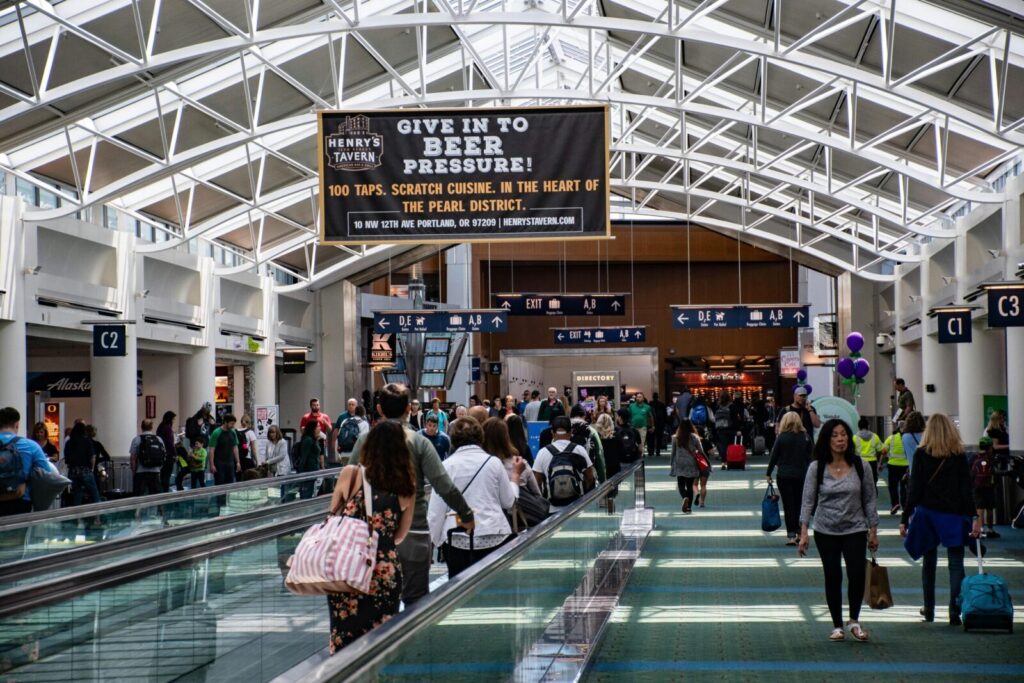Traveling to a new country often comes with a mix of curiosity and preconceptions, and the United States is no exception. For many French travelers, imagining life in America involves colorful stereotypes shaped by movies, TV shows, and popular culture. From assumptions about lifestyles to cultural habits, these ideas often paint a picture that is both amusing and exaggerated. While some impressions have a kernel of truth, others may surprise visitors once they experience the diversity of American life firsthand. Understanding these perceptions highlights how culture shapes expectations and encourages a more open, curious approach to travel. Exploring these common stereotypes allows us to see the human side of cultural assumptions and appreciate the nuances of everyday life across the Atlantic.
1. Americans Are Always in a Hurry

Many French travelers imagine Americans constantly rushing, juggling multiple tasks, and living a fast-paced lifestyle. This idea often comes from movies showing busy city streets, crowded offices, and people eating on the go. While it’s true that efficiency and time management are valued in the U.S., daily life also includes moments of relaxation, weekend gatherings, and leisurely activities. People may plan their schedules carefully, but they still enjoy downtime. Life is not uniformly hectic everywhere. Visitors often discover that American cities and towns balance activity with quiet neighborhoods, parks, and cultural events that provide a slower pace, showing that the stereotype of constant hurry is only part of the picture.
2. Everyone Loves Fast Food

It’s often assumed that Americans only eat burgers, fries, and soda, leading to a perception that fast food dominates daily life. In reality, American cuisine is extremely diverse, reflecting a mix of cultures, regional specialties, and growing interest in health-conscious options. Farmers’ markets, vegetarian restaurants, and international cuisines thrive alongside traditional comfort foods. Many Americans enjoy cooking at home or exploring fresh, locally sourced meals. While fast food is convenient and widely available, it is just one aspect of American eating habits. Visitors are often pleasantly surprised to find a range of dining experiences, from gourmet dishes to small-town family-run diners, highlighting the country’s culinary variety.
3. Americans Are Loud and Outgoing

Some visitors expect Americans to be overly talkative or expressive in public, assuming that extroversion is universal. While friendliness and approachability are common traits, personalities vary widely across regions, communities, and individuals. In cities, people may appear busy but are still polite and willing to interact. In quieter towns, social interactions may be more reserved, reflecting local norms. Americans express themselves in diverse ways, whether through casual conversations, professional settings, or social events. Visitors often find that the stereotype of constant outgoing behavior does not reflect everyone’s experience. Many people enjoy privacy, introspection, and calm social settings, showing a balanced and nuanced social culture.
4. Everyone Drives Everywhere

France’s urban centers rely heavily on public transportation, so French visitors may expect that Americans always drive long distances, even for simple errands. While car culture is prominent in many areas, large cities and some suburban regions offer well-developed public transit, walking paths, and bike-friendly infrastructure. People also adapt based on convenience and geography. In urban areas like New York or Boston, owning a car is often unnecessary, and public transport is a practical and popular choice. Visitors are often surprised by the variety of commuting options, the availability of ride-sharing services, and pedestrian-friendly neighborhoods, revealing that American transportation habits are more flexible and region-specific than commonly imagined.
5. Americans Are Obsessed with Fitness

The stereotype of gym enthusiasts and marathon runners is widespread, fueled by media portrayals of athletic lifestyles. While health and fitness are important to many Americans, lifestyles vary considerably. Some prioritize regular exercise and organized sports, while others focus on hobbies, family, or work commitments. Fitness culture includes gyms, yoga studios, outdoor recreation, and community sports, but participation is personal and not universal. Visitors often discover that Americans balance exercise with other aspects of life, and wellness looks different depending on individual preferences. This stereotype oversimplifies a complex reality, where physical activity is one of many ways people maintain health and personal well-being.
6. Everything Is Huge

From cars to houses to food portions, size is often exaggerated in the imagination of French travelers. While some items, such as SUVs or certain fast-food portions, are larger than in Europe, most daily life involves sizes similar to those in other countries. Shopping, dining, and living spaces vary widely by region, city, and personal preference. Many Americans live in apartments, small homes, or shared housing, and practical considerations often influence size choices. The stereotype of constant “bigness” overlooks subtlety and diversity. Visitors often find a mix of standard and oversized items, and the reality is far more nuanced than the caricature of everything being enormous or excessive.
7. Americans Are Always Friendly

Visitors often expect constant politeness and smiles, assuming that friendliness is uniform across the country. While Americans are generally approachable and courteous, interactions vary depending on context, location, and individual personality. In casual settings, greetings and small talk are common, especially in smaller towns or social events. In professional or urban environments, interactions may be more reserved, reflecting workplace norms or busy lifestyles. Many visitors are pleasantly surprised to find genuine warmth and helpfulness in unexpected places. This stereotype can lead to unrealistic expectations, but it also highlights an important cultural value: Americans often aim to create positive social interactions, even if expressions of friendliness differ across regions.
8. People Constantly Work and Never Relax

The stereotype of nonstop productivity paints Americans as overworked and obsessed with efficiency. While ambition and hard work are important values, most people balance career, family, and leisure. Americans take vacations, enjoy hobbies, and spend time with friends and loved ones. Workplace cultures vary, and not everyone is consumed by their jobs. Observing local routines, visitors can see community events, recreational activities, and simple moments of relaxation that contradict the image of endless work. The reality is that Americans, like people everywhere, strive for balance between obligations and personal enjoyment, revealing a more holistic approach to life than the stereotype suggests.
9. Americans Are Obsessed with Money

Economic ambition and entrepreneurship are often emphasized in media portrayals, leading to the belief that Americans are focused solely on financial success. In truth, people pursue a wide variety of goals, including education, family life, hobbies, volunteering, and personal growth. While financial security is important, it is balanced with other priorities. Many Americans value experiences, relationships, and community contributions just as much as material wealth. Visitors quickly notice that motivations differ greatly among individuals and regions, showing that the stereotype of constant financial obsession oversimplifies the nuanced values and goals that shape everyday life in the U.S.
10. Pop Culture Is Everything

From Hollywood movies to celebrity gossip, French travelers may assume pop culture dominates American life. While entertainment is widely consumed, regional traditions, local events, community involvement, and family activities play a major role in daily routines. Americans often balance media with education, outdoor activities, volunteer work, and personal interests. Cultural tastes vary by region, age, and personal preference, reflecting a rich and diverse society. Visitors frequently discover that pop culture is just one aspect of American life, and assumptions about its dominance overlook the depth, complexity, and variety of cultural practices that exist across the country.
Comments